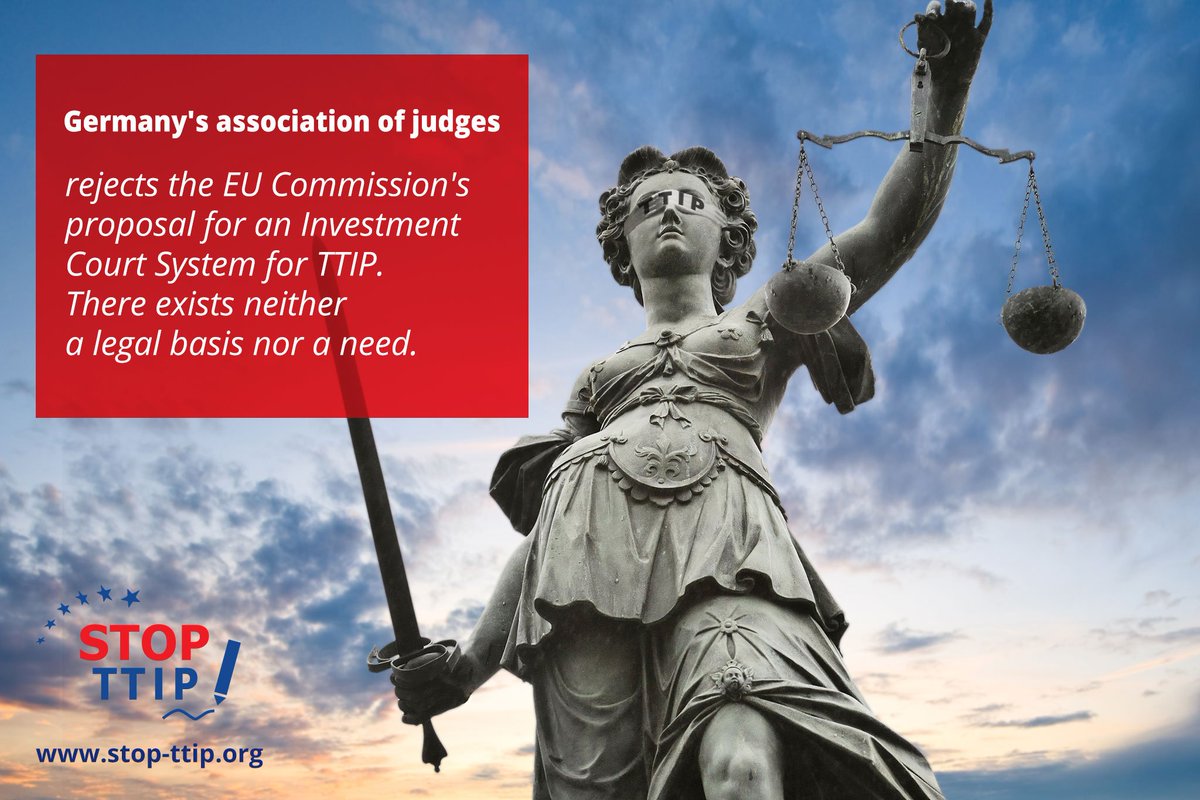This
on the day when the NZ government signs the nation’s sovereignty
away
Investment
Court Has 'No Legal Basis' in TTIP - German Magistrates Union
3
February, 2016
Highly controversial plans to allow multinational corporations to sue governments in the proposed TTIP trade deal have been dealt a huge blow, with Germany's largest association of judges and public prosecutors saying there was "neither a legal basis nor a need" for such measures to be introduced.
The
German Magistrates Association (DRB) rejected the European
Commission's 'Investment Court System' proposal, which would grant
multinational corporations the right to sue national governments
if they were deemed to have inhibited the investment
opportunities of private companies.
Germany's Association of Judges says @Trade_EU's corporate courts in #TTIP is the wrong way- http://bit.ly/1PPgmlt
The
European Commission tabled the investment court system (ICS) plans
as a compromise, following widespread opposition to the
previously proposed Investor State Dispute Settlement (ISDS)
mechanism.
ICS:
'Lacks Factual Bassi'
Chief
among the DRB's concerns is the legal basis for such an
investor court and whether it is actually needed in the TTIP,
which is being negotiated by the EU and the US.
"The
clearly implied assumption in the proposal for an
International Investment Court, that the courts of the EU Member
States fail to grant foreign investors effective judicial
protection, lacks factual basis," the DRB said.
Largest association of judges in Germanycome out against #ISDS in #TTIP, stating that “neither is there a legal basis nor the necessity”.
12:36 AM - 4 Feb 2016
The
magistrates association argued that any concerns or perceived
weaknesses over the legal protection offered in the legal
systems of member states should have been previously raised
during TTIP negotiations, so the issues could have been look
at internally.
"Only
in this way can the full legal rights to which any
law-seeking party in Germany and the European Union is entitled,
be guaranteed. The creation of special courts for certain
groups of litigants is the wrong way forward."
The
judges also raised concerns over the court's impact on the
sovereignty of TTIP signature states, questioning whether "the
European Union has the competence to institute an investment
court."
"An
ICS would not only limit the legislative powers of the Union and
the Member States; it would also alter the established court system
within the Member States and the European Union. In the opinion
of the German Magistrates Association, there is no legal basis
for such a change by the Union."
Concerns
Over Independence of Courts
The
DRB also echoed the sentiment of campaigners who have raised
concerns over the objectivity of the proposed investment
court and whether they would meet international legal standards.
German judges have dealt a serious blow to proposal of having 'corporate courts' in #TTIP
http://gju.st/1o5KuD2
"Neither
the proposed procedure for the appointment of judges of the
ICS nor their position meet the international requirements for the
independence of courts. As such, the ICS emerges not as an
international court, but rather as a permanent court
of arbitration," the association said.
In
a statement sent to Sputnik, Nick Dearden, director of UK-based
anti-TTIP campaigners Global Justice Now, said the DRB's criticism
justifies his group's ongoing campaigning against investment
court procedures being included in trade deals like TTIP.
"This
statement by German judges completely supports what campaigners
have been saying: the Commission's 'compromise' proposal is actually
about trying to legitimize the handing of special
legal privilege to big business. It's not about making
things fairer, but trying to buy off opposition. It's
an assault on the sovereignty of Britain and the EU.
"But
the statement proves the Commission has failed — in fact
they have simply garnered new opposition. After this disastrous
attempt to get themselves out of a deeper hole, we urge the
Commission once again to drop their plans for this toxic
trade agreement and drop TTIP altogether."




 Stop TTIP
Stop TTIP









 Global Justice Now
Global Justice Now


















No comments:
Post a Comment
Note: only a member of this blog may post a comment.